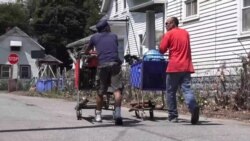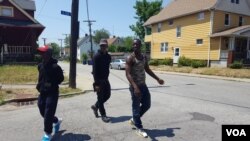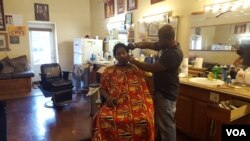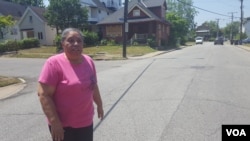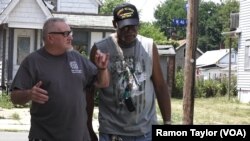"Look at this," says Helen Martin, frowning as she points at a massive chunk of missing sidewalk on the street near her house in the Mount Pleasant neighborhood of Cleveland, Ohio. "They don't care. That can be like that," she says with a look that mixes bewilderment and resignation.
Mount Pleasant, one of the city's poorest neighborhoods, is filled with hundreds of vacant and crumbling homes. The predominantly African American section in eastern Cleveland is far from the glitz and parties staged for the 50,000 visitors and 2,500 Republican delegates who have come and gone from the “Rock and Roll Capital of the World.”
Skipping past the state-of-the-art basketball arena — the site of the RNC convention — and the towering Greek and Classical Revival-series architecture of the mid-1800s and early 1900s, on the other side of town is the International Village neighborhood.
The once-white working class community on Cleveland’s west side has fallen on hard times in the last two decades — a product of long-gone manufacturing and construction jobs and a recent influx of unemployed Ohioans and immigrants.
“The people who have moved into the neighborhood — they come without a job, without money,” explained Art Ledger, a retired Vietnam veteran and taxidermy shop owner. “They came here because it was actually cleaner and safer.”
Jobs, new investment
As he sets forth from Cleveland, Republican presidential nominee Donald Trump seems to be speaking directly to the people in these two downtrodden sections. He has vowed to bring back manufacturing and well-paying jobs to Ohio and the "Rust Belt.” He speaks of improving the nation's crumbling infrastructure — a promise that he hopes will garner the support of this state’s blue-collar Democrats, wary of international competition - and turn the state red.
In his vice presidential announcement last week, Trump touted Indiana governor Mike Pence's record on infrastructure, pointing to a CNBC study that ranks Indiana number one nationwide on the issue — that, and his own record as a billionaire businessman.
"Nobody in the history of this country has ever known so much about infrastructure as Donald Trump," said Trump, referring to himself in the third person.
"We're building, we're building."
East side residents skeptical
The reaction to Trump in the two neighborhoods is a mix: Some are unconvinced. Others have little hope of help from either major party. A few seem open to the unconventional proposals of the Republican nominee.
In Mount Pleasant, where hundreds of homes remain vacant and deteriorating after the 2008 foreclosure crisis, Helen Martin thinks Trump's promises to improve infrastructure are disingenuous.
"I think it's a show, and when it's over, he'll get back to doing whatever he is going to do -- the schools, the steaks, the ties, whatever and keep on living," says Martin, who says she supports the Democratic candidate, Hillary Clinton.
Ray Jefferson, who cuts hair in the Mount Pleasant barbershop, worries what Trump’s focus on business will mean for the less fortunate residents in his neighborhood.
"The real message I get from Trump is like, 'If you're down, I'm going to keep you down, but if you're up, I'm going to look out for you,'" he said.
West Side needs jobs
On West 48th, a hot breeze rustles a sea of weeds growing through sidewalk cracks. Fences are caved, houses boarded. By one home, a plastic playset lies dented on its side, worn and faded by the sun.
People here want solutions.
“They are looking for someone to actually tell us what kinds of jobs you are going to create. Everybody can be a waitress in the morning, but everybody can’t own the restaurant,” the veteran, Art Ledger says.
Trump’s plan to wall out immigrants doesn’t resonate among newcomers here. “That won’t work in International Village,” Ledger says.
One construction worker, who didn’t want to reveal his name, said its been tough lately, but neither Trump nor Clinton is worthy of his vote.
“They’re both lousy candidates,” he grouses. “If I had to choose, I’d pick Trump.”
John Meehan, a retired accountant in the west side neighborhood, is all in for the businessman. He switched party affiliations last year, citing a need for change to problems that have not gone away.
“There are so many young people today that don’t have the jobs,” said Meehan. “They can’t get the skills because of the education system, and we end up taking a lot of American jobs and putting them overseas.”
Revitalizing neighborhoods
Cleveland civic leaders are working to bring back neighborhoods like Mt. Pleasant and International Village.
Marie Kittredge of the Opportunity Corridor Partnership is one of those. Her organization is creating a grand boulevard though impoverished blocks on the east side.
"We're not a nation that values public investment at this point. We're not valuing infrastructure," she says adding that the presidential race is not focusing on urban issues. "I haven't seen either candidate have a real grasp on urban issues."
But Kittredge suggests efforts to rebuild the city center, to create “a strong urban core” will ripple outward into the neighborhoods of neglect.
In Mount Pleasant, Helen Martin says officials find money for building stadiums and museums but say there is none for the neighborhoods. “Do it for us," she pleads.
At a watering hole on the west side, as the politicians prepare to leave on their last day in town, you can faintly hear the voice of Republican Senator Ted Cruz from a television overhead, but nobody is watching. Everybody is drinking beer.




